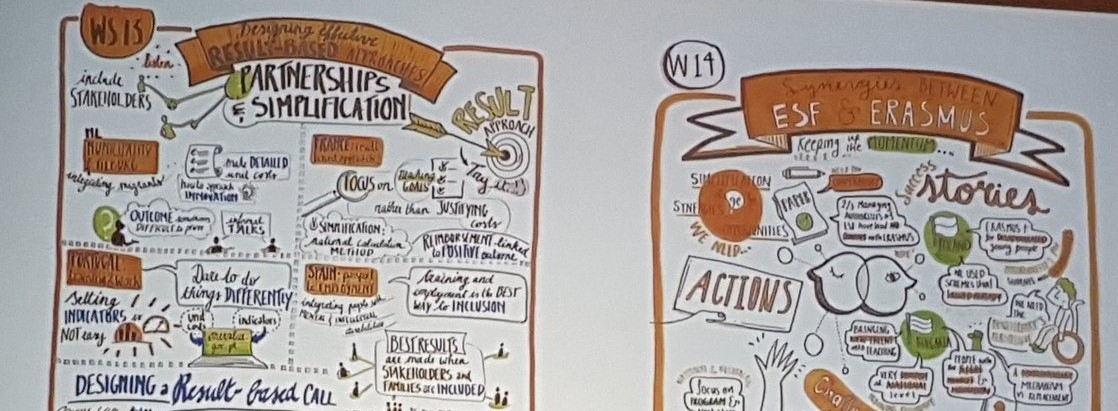
On 21-22 May 2019, the Technical Secretariat of EURoma and representatives of some of the Network partner managing authorities took part in the annual conference of the European Social Fund (ESF) Transnational Platform. Financed by the European Commission, this Platform aims to contribute to the promotion and implementation of transnationality in the framework of the ESF.
Under the theme “ESF Transnational Cooperation: including and empowering people throughout life”, the conference brought together close to 300 participants from relevant organisations for the design, management and implementation of ESF, including ESF managing authorities, project promoters and beneficiaries, representatives of the European Commission and other EU institutions and civil society organisations and networks at European and national level. This was the closing event of the ESF Transnational Platform, which ends its work in July.
It pursued a twofold objective:
- To disseminate to a wide audience the lessons learnt from ESF transnationality, in particular from the work of the nine Thematic Networks financed by the European Commission to address transnational cooperation in specific areas (employment, inclusion, youth employment, learning & skills, governance and public administration, social economy, simplification, partnership and migrants), as well as from transnational projects.
- To promote the exchange and debate on how the ESF and transnationality can concretely support the experimentation of approaches to tackle unmet social and labour market needs, as well as pressing societal challenges.
Selected ESF funded projects, including transnational ones, were also presented to illustrate how the ESF has improved people’s living and/or working conditions.
Besides the discussions in plenary, participants had the opportunity to focus on a wide range of specific topics within the 18 workshops organised around three sub-themes:
- How the ESF includes and empowers people throughout life, addressing, among others, children’s early years, disadvantaged youth people, job carving for inclusive employment and the empowerment of local communities through community-led local development approaches (CLLD).
- How the ESF alleviates personal and societal challenges, including its role to promote an increased diversity and inclusiveness as well as the fight against discrimination at the workplace and in communities at large, the importance of digital skills in future labour skills and the use of microcredit and financial instruments for social entrepreneurship and self-employment.
- How governance and synergies enhance ESF effectiveness, including the role of partnerships and simplification, the macro-regional strategies as strategic frameworks for transnational collaboration, health equity and access to health by vulnerable groups, social innovation and the combination of ESF and EFSI.
In addition, the gender dimension of the ESF and the linkages with the Sustainable Development Goals were discussed.
Ideas such as the importance of partnership and cooperation at all levels and with all relevant stakeholders, the complementarity of funds, the holistic approach, the use of person-centered approaches and the potential of ESF to support long-term and intensive interventions leading to actual changes were mentioned during the discussions.
There was a general consensus among participants about the value of transnational cooperation within the ESF and the importance to maintain and reinforce it in the 2021-2027 programming period, both directly by the European Commission as well as by individual Member States. EURoma agrees that transnational cooperation is a key tool for social innovation and therefore further emphasis should be given to its mandatory component (“shall”) and its focus on the most disadvantaged groups such as Roma, both from the direct and indirect ESF+ management. Promotion of active transnational cooperation (both multilateral or bilateral) on Roma issues should be foreseen as an effective way to advance in social cohesion. Transnational cooperation contributes to providing the adequate conditions to allow for active transfer of existing positive practices to other EU contexts and for establishing cooperation mechanisms between countries of origin and destination of EU Mobile Roma to jointly find solutions and improve their living conditions (see EURoma’s position paper ‘How the future 2021-2027 European Social Fund Plus (ESF+) can better contribute to Roma inclusion and equality’).
The EURoma Network is in fact a clear example of how transnational cooperation can help address the challenges faced by ESF. Since 2007, public authorities from 15 Member States with competences on the management of ESI Funds and on national policies targeting Roma work together to improve the use of these funds to promote the social inclusion, equal opportunities and fight against discrimination of the Roma community.
The European Commission proposes that at EU level €200 million are devoted to transnational cooperation. These funds would be coordinated by a managing authority (to be selected) with the task to help Member States to ‘identify the challenges and the solutions already on the ground and to see how to further replicate successful pilot projects around Europe’. As it is the case now, support and actions at EU level would be complemented with those at national level.
Further information on the conference, the ESF Transnational Platform and transnational cooperation within the ESF:
- Conference programme
- Dedicated folder with the presentations
- Recommendations/Key issues raised in the framework of the 18 workshops
- Summary document on the ESF Transnational Platform Legacy
- ESF Transnational Platform’s website
- ESF Transnational Platform’s publication ‘Lessons learned from Transnational Cooperation’

